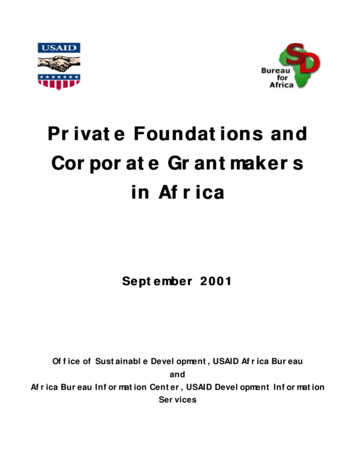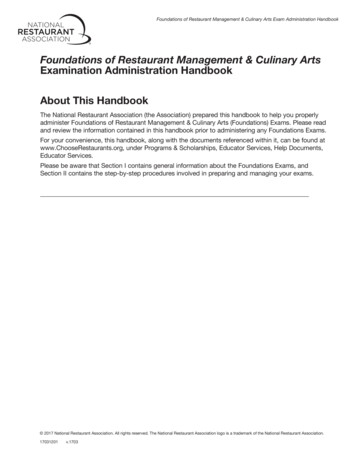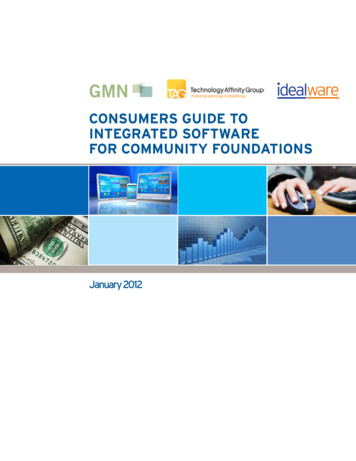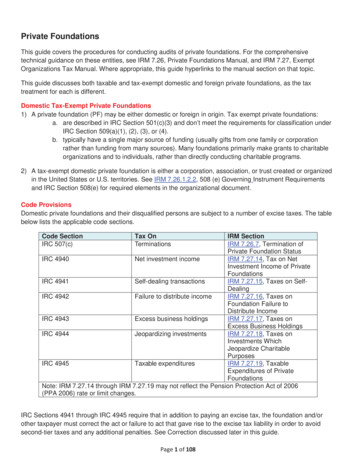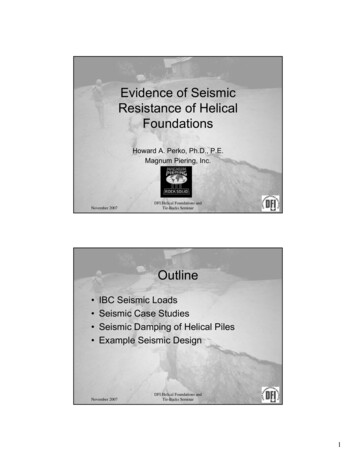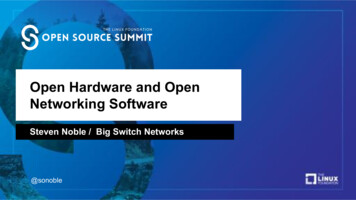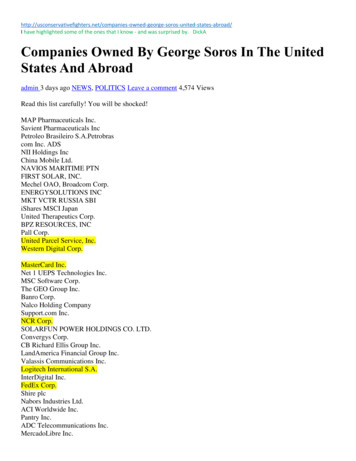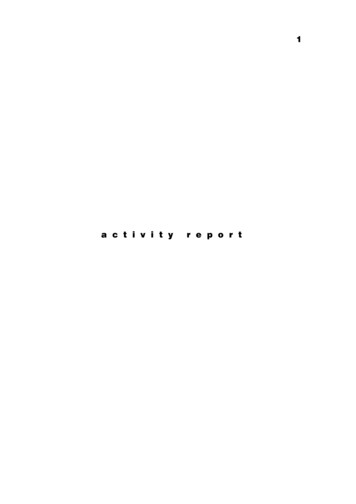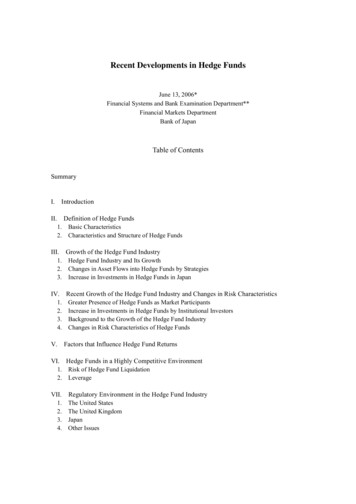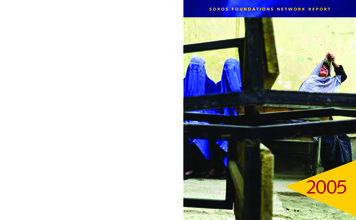
Transcription
SOROS FOUNDATIONS NETWORK REPORTvibrant and tolerant democracies whosegovernments are accountable to theirto shape public policies that assure greaterfairness in political, legal, and economicsystems and safeguard fundamental rights.On a local level, OSI implements a rangeof initiatives to advance justice, education,public health, and independent media.At the same time, OSI builds alliances acrossborders and continents on issues such ascorruption and freedom of information.OSI places a high priority on protectingand improving the lives of marginalizedpeople and communities.SOROS FOUNDATIONS NETWORK REPORTcitizens. To achieve its mission, OSI seeks2005The Open Society Institute works to buildOPEN SOCIETY INSTITUTEwww.soros.orgOSI2005
BUILDINGOPEN SOCIETIES2005
Building Open Societies:Soros Foundations Network 2005 ReportCopyright 2006 by the Open Society Institute400 West 59th Street, New York, NY 10019 USAAll rights reserved, including the right to reproducethis book or portions thereof in any form.COVER PHOTOGRAPH:An Afghan woman relaxes at apolling station after casting her vote.INSIDE COVER PHOTOGRAPH:A group of young girls studythe Koran at a mosque in Afghanistan.PHOTOGRAPHER:Lana SlezicComplete photography credits on page 1912005 REPORT2
Contents6PRESIDENT’S MESSAGECivil Society: Global Advances and Local Resistance12ADVOCACY POLICYEuropean Union, Roma, HIV, Access to Information,Revenue Watch, International Justice, Torture,Katrina and Poverty60REGIONS60ASIA62Central EurasiaCentral Eurasia Project; foundations in Armenia,Azerbaijan, Georgia, Kazakhstan, Kyrgyzstan, Mongolia,Tajikistan, Turkey70Southeast AsiaBurma Project/Southeast Asia Initiative72China73MIDDLE EASTMiddle East and North Africa InitiativeSOROS FOUNDATIONS NETWORK3
767879EUROPEEUMAPCentral and Eastern EuropeFoundations in Bulgaria, Czech Republic, Estonia,Hungary, Latvia, Lithuania, Poland, Romania, Slovakia88South Eastern EuropeFoundations in Albania, Bosnia and Herzegovina,Croatia, Kosovo, Macedonia, Moldova, Montenegro,Serbia91Ukraine and Russia92AFRICAAfriMAP; foundations in South Africa, SouthernAfrica, East Africa, West Africa104LATIN AMERICA AND THE CARIBBEANLatin America Program; foundations in Guatemala, Haiti108INITIATIVES108Law and GovernanceOpen Society Justice Initiative, Human Rights andGovernance Grants Program, Network Women’sProgram, Roma Programs, Local Government andPublic Service Reform Initiative122Public HealthPublic Health Program, Mental Health Initiative2005 REPORT4
128Education, Information, and MediaNetwork Children and Youth Programs, EducationSupport Program, International Higher EducationSupport Program, Network Scholarship Program,Information Program, Network Media Program136Other ProgramsArts and Culture Network Program, East East: PartnershipBeyond Borders Program, Economic and BusinessDevelopment Program, International Policy Fellows;Related Institutions: Central European University,Central European University Press, Open Society Archives142U.S. PROGRAMSU.S. Justice Fund, Special Initiatives, Fellowships,Youth Initiatives, OSI–Baltimore, DocumentaryPhotography Project166OPEN SOCIETY INSTITUTEOffices: New York, Budapest, Brussels, London, Paris,Washington, D.C.; Chairman’s and Presidential Grants;OSI Ombudsman; Application Information; Partnerships1782005 EXPENDITURES183DIRECTORYSOROS FOUNDATIONS NETWORK5
PRESIDENT’S MESSAGE2005 REPORT6
SOROS FOUNDATIONS NETWORK7
Civil Society: Global Advancesand Local Resistance THE FIFTH ESTATE.Protestors atMay Day rallyin Moscow.ACCORDING TO Carlyle’slike China, where legal registration is very difficult,famous story, Edmund Burkethe numbers of NGOs concerned with such issuesonce pointed to the gallery inas HIV/AIDS and the environment are proliferatingthe House of Commons whererapidly. In some other countries, there exist literallythe journalists were sitting andfirst referred to its occupants asWorldwide, NGOs have had their greatestthe “Fourth Estate.” Burke meantimpact on public policy in two fields: environmentalthat the press, like the other threeprotection and human rights. Both of these issuesestates in Parliament—the clericalengendered significant citizen movements in thehierarchy, the peers, and the commons—was a participant in thegoverning of England. If Burke werewith us today and all the other estateswere still significant in government,he might designate a “Fifth Estate”: nongovernmental organizations. NGOs havether. Probably the first NGO in the internationalhuman rights field was a group formed in Londonduring the latter part of the 18th century to campaign against slavery in the British Empire. Early on,its efforts resulted in a judicial decision requiringthat slaves from the colonies brought to England hadto be set free. The group inspired the developmentcountries of the world. The main exceptions arerole in ending slavery in the United States severalthem entirely—such as North Korea—or make italmost impossible for them to operate—such asBurma, Libya, and Turkmenistan. Even in a country81970s, though their roots go back a great deal fur-grown greatly in number, size, andsignificance in recent years in almost alla few of the most repressive states that either ban2005 REPORThundreds of thousands of NGOs.of the abolitionist movement that played a crucialdecades later. Today, millions of people identify withthe environmental and human rights movementsand support local, national, or international NGOs inthese fields.
PRESIDENT’S MESSAGEAnother important movement also becameA disturbing current trend is a crackdown onsignificant internationally in the 1970s, the movementNGOs in a number of the countries of the formerthat promotes women’s equality, though the NGOs inSoviet Union. Turkmenistan has always impededthis field are far less well developed than those con-their development. Belarus began restricting theircerned with the environment or human rights. Moreoperations several years ago. And Uzbekistanrecently, starting in the 1990s, an internationaladopted legislation in 2004 making it very difficultcitizens’ movement opposing corruptionfor them to obtain foreign funding. Also, followingand promoting budget transparency has becomethe earlier example of Belarus, Uzbekistansignificant. NGOs developing in this field seem to berapidly acquiring the sophistication of some of theclosed the Open Society Institute’sfoundation in that country and, at this writing, isolder groups in the environmental and humanconsidering a new law imposing further restrictionsrights fields.on NGOs. Kazakhstan’s parliament is also debating adraft law restricting foreign financing of NGOs; andOSI’S SUPPORT FOR NGOSWORKING FOR HUMAN RIGHTSAND TRANSPARENCYand make registration of new NGOs more difficult.The Open Society Institute and the Soros founda-The minister of justice in Kyrgyzstan recently calledtions network have been leading financial supportersfor scrutiny of all foreign-funded groups but backedof NGOs concerned with corruption and transparencydown when Kyrgyz NGOs criticized the proposal. Evenas well as human rights and women’s equality. In thein Latvia, a member state of the European Union, twopast, we have not been a significant source of supportparties in the ruling coalition have proposed to banfor groups promoting environmental protection,foreign-funded groups from monitoring elections.though this is beginning to change. We are becomingthe parliament in Tajikistan has before it a draft lawthat would require all existing NGOs to reregisterRussia’s crackdown on NGOs has attractedactive in this field in the United States, which is by farthe greatest media and public attention. In Januarythe major contributor to global warming today, and,2006, President Vladimir Putin signed legislationto a more limited extent, in China, which is rapidlyadopted by the Duma that gives the governmentcatching up to the United States and will probablyextensive new powers over NGOs and makes it easysurpass it within the next 20 years as a factor into shut them down. It appears that Putin sought theclimate change.new legislation out of a belief that NGOs played a partSOROS FOUNDATIONS NETWORK9
in the Rose Revolution inGeorgia and in the OrangeRevolution in Ukraine. Themajor factor in both these caseswas widespread popular disenchantment with the previousgovernments because of extensivecorruption. But NGOs, especiallyones with international support,have received the blame and becomescapegoats for officials in the Kremlinunhappy that the new governments inthese countries are not as firmly underMoscow’s thumb as their predecessors. Putin’s influence seems to be aprincipal factor in the crackdown onNGOs throughout the region.U.S. FAILURE TOCRITICIZE RUSSIA’SCRACKDOWN ON NGOSUp to now, the main impedimentto an even more drastic crackdown on NGOs in the formerSoviet Union has been a certainamount of criticism by a fewWestern governments. GermanChancellor Angela Merkel hasbeen the most outspokenWestern leader in criticizing2005 REPORT10
the Russian government’s actions. The UnitedStates has expressed concern about theactions of the smaller countries in theregion. But Washington has been lessinclined to criticize Putin, whom it apparently considers a valuable ally in the“war on terror.” Putin alreadycontrols all the other relevantestates in Russia—includingmost of its Fourth Estate. If he alsouses his new powers to destroywhat has become a vibrant NGOsector in Russia, he will reestablish control similar to that exercised by the Kremlin during theperiod when the Soviet Union wasstill intact. The Fifth Estate of NGOs,on which he is now focused, is almostalone in standing in his way.The Open Society Institute, as thepages of this report show, continues tosupport nongovernmental organizationsworking for democratic elections, accountability in government, the rule of law, andrespect for human rights. Without a vibrantFifth Estate, new open societies fail toblossom and older ones shrivel up and die.Aryeh NeierMay 2006Mist shrouds an abandoned dock in Ukraine.SOROS FOUNDATIONS NETWORK11
ADVOCACY 2005 REPORT12
POLICYSOROS FOUNDATIONS NETWORK13
Advocacy and policy change play anincreasingly significant role in the workof the Open Society Institute and RESPECT FOR DIVERSITY.Muslim demonstratorspause to pray in London.the Soros foundations network.The network first promoted thebuilding of open societies on a countryby-country basis by providing financialsupport and creating national foundations.The network now focuses on efforts toestablish policies that advance open societyprinciples and practices. OSI and thenetwork pursue these advocacy efforts withgrantmaking and operating programs, publiceducation, pressure, and persuasion.2005 REPORT14
ADVOCACY POLICYEuropean UnionE U R O P E A N I N T E G R A T I O N has been adrivingforce for peace, stability, democratization,and prosperity across the continent. More thanany other single actor, the European Union has spread thevalues of open society by providing a development modelfor other countries, and the financial and technicalassistance for adopting it. During 2005, Croatia andTurkey began negotiations to enter the European Union;Macedonia obtained EU candidate status; and the EuropeanNeighborhood Policy produced concrete results in Ukraineand Moldova. At the same time, the EU faced a crisis ofdirection and identity after voters in France and theNetherlands rejected the EU’s constitutional treaty. Memberstates disagreed publicly over the EU’s next seven-year budget.And racial and ethnic riots flared in the outlying suburbs ofParis and other French cities.SOROS FOUNDATIONS NETWORK15
Media Freedomin EuropeWhile there are nearly 4,000television channels in Europe, theThe Open Society Institute advocates fora European Union that promotes andtelevision market is highlyconcentrated in terms of bothownership and audience shares. Inmost countries, a handful ofchannels attract the vast majority ofviewers. Ownership structures arecontrolled by a few companies andoften shrouded in secrecy. Politicalpressure on regulators and publicservice broadcasters is widespread.These developments jeopardizeenforces the values of an open societyamong its members and spreads thesevalues to other countries through itsexternal policies and assistance programs.OSI undertook a variety of activities insupport of EU-related policies in 2005.pluralism and diversity inbroadcasting and threaten toundermine the pivotal contributionEUROPEAN NEIGHBORHOOD POLICYtelevision can make in supportingdemocracy, especially in the newdemocracies of Central and EasternEurope. Television across Europe:regulation, policy and independence,a monitoring report produced byOSI’s EUMAP, is the largest-evercomparative survey of television in20 European countries. Based uponthe report’s findings, OSI isencouraging the EU to establish anindependent agency to monitormedia markets and mediaconcentration in the EU and inglobal markets and to ensuretransparency of media ownership.The goal of the EU’s EuropeanNeighborhood Policy (ENP) is to foster thedevelopment of closer relationshipsbetween the EU and the countriesbordering it, based on a respect forcommon values, but without offering thesecountries full EU membership. Moldovaand Ukraine have already agreed with theEU on individual action plans, while plansfor Armenia, Azerbaijan, and Georgia are inthe works.2005 REPORT16
ADVOCACY POLICYOSI focused its activities on promoting civil societyinvolvement in the development and monitoring of the ENPprocess, both in Brussels and in the countries concerned;supporting the transfer of knowledge and expertise about theEU from the new EU member states to their neighbors;making rule of law the cornerstone of theENP action plans; and advocating for effective EU funding forENP implementation. Ukrainian experts supported by OSImade recommendations for the EU-Ukrainian action plans inthe policy areas of judicial reform, access to justice, mediaindependence, and improvement of human rights. Most of therecommendations were included in the plans.In Moldova, the European perspective played a crucial role inuniting political and social forces around a national cause,reforming election procedures, and ensuring the independenceof the judiciary and media. OSI advocacy contributed to EUdecisions to open a European Commission delegation inChisinau, to appoint a special representative to Moldova, forthe EU to obtain observer status at the Moldova-Transnistrianegotiations, and to send a border assistance mission toSOROS FOUNDATIONS NETWORK17
reduce human trafficking, smuggling, proliferationof weapons, and customs fraud. The EU grantedMoldova important duty and quota-free access tothe EU market.EU ENLARGEMENTAfter the EU’s latest wave of enlargement in 2004, theaccession process continues to be the main driver ofdemocratic transition in Eastern and South EasternEurope. Bulgaria and Romania will likely join the EU in2007; Croatia, Turkey, and Macedonia are at differentstages of the accession and candidate process.One of OSI’s objectives is to ensurethat the EUenlargement process produces moreopen societies. To this end, OSI facilitates civilsociety input into the European Commission’s regularmonitoring reports on Albania, Bosnia and Herzegovina,Bulgaria, Croatia, Kosovo, Montenegro, Romania,Serbia, and Turkey. The reports have reflected many ofOSI’s concerns about corruption, organized crime, and2005 REPORT18
ADVOCACY POLICYthe plight of the Roma and other minorities. In order toprevent the creation of a belt of poverty and marginalizationon the EU’s borders, OSI and the European Stability Initiativeadvocate for developing EU policies that provide support forsocioeconomic cohesion to South Eastern European nations.EU FUNDING AND THE FUTURE EU BUDGETThe EU is one of the biggest foreign donors worldwide. Itsforeign assistance budget in 2005 was approximately 8.548billion euros, including preaccession aid. However, the EUalso has a notorious reputation as one of the world’s slowestand most bureaucratic donors.In a coalition with other Brussels-based NGOs, OSI iscampaigning for an overhaul of the EU’s financial regulationsand implementing rules to make EU funding for civil societyactors more effective and efficient. The European Commissionincluded several of the coalition’s recommendations in aproposed revision of the current rules. OSI is also advocatingfor continued funding for promotion of human rights anddemocracy as part of the EU’s 2007–2013 budget.SOROS FOUNDATIONS NETWORK19
2005 REPORT20
ADVOCACY POLICYRomaT H E R O M A , Europe’s largest ethnic minority, havenot benefited from the dramatic transition to democracythat has swept over Central and Eastern Europe since1989. The continued segregation, discrimination, andextreme poverty faced by the Roma are among the mostcritical deficits for open society in Europe today.The Decade of Roma Inclusion, 2005–2015, aninitiative supported by OSI and the World Bank, isan unprecedented international effort to eliminatediscrimination against the Roma and ensure thatRoma have equal access to education, housing,employment, and health care. The Open SocietyInstitute advocates for equalparticipationof Roma in all spheres of publiclife. Systemic policy reform in education forSOROS FOUNDATIONS NETWORK21
Roma remains a priority for OSI, and it provides the RomaEducation Fund with an annual contribution of 3 millionfor its efforts to ensure that Romani children have accessto a quality education based on school desegregation.NATIONAL ACTION PLANS FOR THE ROMA CONCERN FOR THEMARGINALIZED.Residents in a Romanineighborhood inSlovakia.OSI and the Soros foundations undertook a variety ofactivities at the national level during 2005, includingsupport for the advocacy initiatives of Romani civicorganizations and alliances, such as the monitoring ofnational Romani strategies, national action plans, andnational budgets. OSI’s foundation in Romania organized aseries of high-profile debates on Romani inclusion and fundeda publication program with Revista 22, a highly respectedweekly magazine. In Bulgaria, OSI supported a network ofRomani community centers to act as mediators between theRoma and local governments. Together with the World Bank,OSI funded public opinion surveys on attitudes toward Roma inall countries that have signed on to the Decade of RomaInclusion and used the results of these surveys to designeffective initiatives attacking the negative image of the Roma.2005 REPORT22
ADVOCACY POLICYEU STRATEGY FOR THE ROMAOSI advocates for the development of an EU strategy thatcombines complementary approaches to crafting governmentpolicies aimed at fighting discrimination against the Romaand achieving their full integration into the greater society.OSI promotes the effective use of existing EU funding, for newfunding instruments, and for the alignment of EU policy andfunding with the national action plans of the Decade of RomaInclusion. OSI is also a consultation partner of the EuropeanCommission on Roma and works with various EuropeanCommission departments in the areas of social inclusion,antidiscrimination, microfinance, entrepreneurship, and health.OSI’s Roma Participation Program assists Romani NGOsin using EU structural funds effectively and developing modelsfor EU and national cofunding. Since it is crucial that Romamake their own case before EU policymakers, OSI worksclosely with the Romani-run European Roma InformationOffice in Brussels and funds 10 Romani internships at theEuropean Commission.SOROS FOUNDATIONS NETWORK23
2005 REPORT24
ADVOCACY POLICYHIVT H E H I V epidemic consistently strikes those whoseaccess to information, public services, and economicopportunity is most limited: poor women, drug users,sex workers, and ethnic minorities. Discriminationmakes the epidemic worse. Sex workers and drugusers—who, for example, make up more than 80percent of those infected with HIV in the countries ofthe former Soviet Union—are sometimes subjected toforced testing, mandatory institutionalization, and massincarceration as well as to less formal but powerful formsof discrimination in housing, employment, and healthcare. Government efforts to control and contain these“undesirables” often accelerates HIV infection by forcingpeople away from services and into risky environments wheremeans of disease prevention, such as condoms, clean needles,and access to treatment or health information, are unavailable.SOROS FOUNDATIONS NETWORK25
Working with the Soros foundations network and otherpartners, OSI presses for policies that ensure access toinformation about HIV, to the means of prevention, and totreatment and care. EffectiveHIV advocacy—like the epidemic itself—extendsbeyond national borders, and, in its EQUALITY OF HEALTHDoctor verifiesa positive HIV testin Zambia.CARE.advocacy efforts, OSI regularly works with otherinternational actors, including bilateral aid agenciessuch as the U.S. Agency for International Development(USAID), the UK’s Department for InternationalDevelopment (DFID), United Nations agencies, and theGlobal Fund to Fight AIDS, Tuberculosis and Malaria.INFORMATION, PREVENTION, AND TREATMENT FOR ALLSince 1995, OSI has supported a range of HIV-relatedprograms, including peer outreach efforts, needle exchanges,professional training, community mobilization, and policyreform initiatives. In Ukraine, OSI and local advocates workedin 2005 to oppose broadening laws criminalizing drug abuseand to press for broader inclusion of people living with HIV inthe political process. In Russia, OSI’s International Harm2005 REPORT26
Reduction Development Programsponsored a study that documentedOSI Prevails in Suitagainst USAID ProstitutionPledge RequirementIn a victory for free speech and sound publichealth policy, a federal judge ruled in May 2006human rights violations, includingforced HIV testing, refusal of medicalcare to those with HIV, andstigmatization of drug users. OSI alsosupported increasing the availabilityof substitution treatments bythat USAID violated the First Amendment whenit tried to require recipients of U.S. funding forHIV prevention work to sign a pledge opposingprostitution. The Open Society Institute, alongwith its affiliate, the Alliance for Open SocietyInternational (AOSI), and PathfinderInternational filed the lawsuit against USAID inSeptember 2005. The Brennan Center forJustice at NYU School of Law served as OSI'scounsel.The lawsuit did not challenge the U.S.sponsoring conferences and meetingsgovernment’s authority to control how its fundsbetween international experts andpledge requirement restricted both free speechlocal authorities to press successfullyfor the inclusion of methadone andbuprenorphine on the World Healthare spent.The suit asserted, however, that theand the AIDS prevention efforts that thegrantee organizations finance with their ownfunds. Requiring health workers to condemnthe sex workers they are trying to helpintensifies the stigma and fears of thisvulnerable population and makes it harder toOrganization’s Essential Drugs List.reach them with prevention services.Thelawsuit asserted that the pledge requirementwas unconstitutional, because it requiredPrisons are a key focus of OSI’s HIV-private organizations to adopt the government’spoint of view in order to receive funding.related advocacy efforts. In Russia,AOSI is administering a government grant toOSI worked to strengthen a reformthat provides for administrative ratherthan criminal penalties for violators oflaws forbidding possession of smallimplement USAID’s Drug Demand ReductionProgram in Central Asia.The program providescapacity building for professionals; drug abuseprevention education for vulnerable groups(youth, migrants, sex workers, prisoners); andcounseling, drug treatment, rehabilitation, andother services to help people stop using drugs.SOROS FOUNDATIONS NETWORK27
amounts of drugs. In Ukraine, OSI helpedpersuade the government to begin pilot needleexchange programs in two penal institutions.With the UN and Health Canada, OSIcosponsored a global policy dialogue onprisons that focused on lessons learnedfrom countries with needle exchangeprograms and opiate substitutiontreatment programs in penal institutions.PRESSING FOR GREATERRESPONSIBILITY ATTHE UNITED NATIONSOSI worked on several fronts toensure that UN memberstates honor theircommitments to expand access toharm reduction efforts and HIV treatmentand to work to reduce the stigma attachedto HIV. OSI’s Public Health Watch broughttogether local experts in six countries to2005 REPORT28
ADVOCACY POLICYmonitor and assess how governments fulfill thesecommitments and to publish their results during 2006.OSI advocated against U.S. government efforts to make itsopposition to funding for needle exchange into a globalstandard. At the June 2005 meeting of the ProgrammeCoordinating Board of UNAIDS in Geneva, OSI and othershelped thwart an effort by U.S. officials to strike all languageabout clean needles and syringes from a document detailingthe UN’s HIV prevention strategy.STRENGTHENING THE GLOBAL FUNDTO FIGHT AIDS,TUBERCULOSIS AND MALARIAThe Global Fund to Fight AIDS, Tuberculosis and Malaria isperhaps the single largest and most important force in HIVprevention and treatment for marginalized groups. OSIworked on several levels during 2005 to strengthen the Fund.It helped NGOs with their applications for Global Fundsupport and with efforts to turn their proposals into effectiveprograms. OSI’s offices in Washington, D.C., and Europeworked to emphasize the unique importance of the Fundand to urge greater support from donor nations.SOROS FOUNDATIONS NETWORK29
Access toInformationI N F O R M A T I O N I S the oxygen ofdemocracy. The ability of citizens to hold theirgovernments accountable and to participatefully in democratic society rests on theirability to access and comment upongovernment-held information. Humanrights and national securityare better protected when thepress and public can effectively monitorgovernment decisions. By enabling publicscrutiny, laws guaranteeing access toinformation and freedom of expression serveas safeguards against government abuse,subversion of the democratic process, and thesquandering of public assets.2005 REPORT30
ADVOCACY POLICYSOROS FOUNDATIONS NETWORK31
For several years, OSI, led by the Open Society JusticeInitiative, has supported efforts to expand andstrengthen access to information and freedom ofinformation around the world. In 1990, only 12countries had access to information laws. By theIn Senegal,journalists demonstratefor freedom ofinformation.end of 2005, more than 50 additional countries— A FREE PRESS.throughout Central, Eastern and SouthernEurope, Latin America, and parts of Africa andAsia—had adopted such laws, several withsupport from the Justice Initiative and Sorosfoundations.IMPLEMENTING FOI LAWSThe Justice Initiative also promotes the implementation of freedon of information (FOI) laws. Over thepast two years, it has worked with partners in Albania,Argentina, Mexico, Peru, and Romania to gain accessto information about corruption, governmentcontracts, and the salaries of government officials.In Bulgaria, a local NGO, the Access to InformationProgramme, litigated to gain access to documents that2005 REPORT32
ADVOCACY POLICYSOROS FOUNDATIONS NETWORK33
Access to InformationMonitoring ToolThe Justice Initiative has developedthe Access to Informationdemonstrated corruption in the useof EU funds and helped anMonitoring Tool to evaluate theimplementation of access toinformation laws and diagnoseinstitutional obstacles to release ofinformation. Transparency &Silence, a study of 14 countries inEurope, Latin America, and Africa,to be published in 2006, hasconfirmed that governmentsprovide information erratically butthat FOI laws lead to greatertransparency. Requests filed twicereceived different answers in amajority of instances; 47 percent ofrequests in all the countries studiedyielded no response at all; and,most disturbingly, requests filed byRoma, disabled individuals, andmembers of other marginalizedinvestigative journalist identify thekiller of the Bulgarian dissidentGeorgi Markov in London during1978. The Centre for Democratizationand Development of Institutions wonAlbania’s first access to informationcourt case, challenging the centralgovernment’s refusal to releaseinformation on the criteria forlicensing day care centers. In Mexico,litigation by Freedom of Informationgroups received significantly lessinformation than other requestorsand, in some countries, received noinformation at all.Mexico led to a ruling by the MexicanElectoral Tribunal that the salaries ofpolitical party officials be made public.STRENGTHENINGINTERNATIONAL STANDARDSStrengthening international andregional standards is crucial to2005 REPORT34
ADVOCACY POLICYdevelopment of the right to information. In a case in whichthe Justice Initiative filed an amicus brief, the Inter-AmericanCommission recognizedthat the freedom “toreceive” information provided for in the AmericanConvention on Human Rights includes a specific right ofaccess to government-held information and concluded thatChile’s access to information legislation falls short of theConvention’s requirements. In Europe, the Justice Initiative ispart of a working group convened by the Council of Europe todevelop the first treaty on access to official documents.The Justice Initiative has developed a set of core principles onaccess to information laws to be used in efforts to elaboratethe right to freedom of information at the international andregional levels, especially in Africa and Asia, and to opposeefforts by governments to justify restricting access toinformation inappropriately in the name of privacy,commercial confidentiali
Photography Project 166 OPEN SOCIETY INSTITUTE Offices: New York, Budapest, Brussels, London, Paris, Washington, D.C.; Chairman's and Presidential Grants; OSI Ombudsman; Application Information; Partnerships 178 2005 EXPENDITURES 183 DIRECTORY SOROS FOUNDATIONS NETWORK 5

